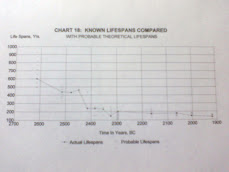
Are you interested in THE AGE OF THE EARTH, DARWINISM, THE HUMAN GENOME, BIBLICAL GENEALOGIES, HARMONIZING SCIENCE AND THE BIBLE? If so, here are some articles that might interest you. I have written a book on this subject entitled "New Evidence for Two Human Origins: Discoveries That Reconcile the Bible and Science." I hope you enjoy this blog which is meant to help us understand ourselves and God's Word. Please return to find new posts. Your comments and emails would be greatly appreciated.
Showing posts with label Were the Creation Days Twenty-Four-Hour Days?. Show all posts
Showing posts with label Were the Creation Days Twenty-Four-Hour Days?. Show all posts
Thursday, June 17, 2010
Were The Creation Days Twenty-Four-Hour Days?
(Revised June 19, 2014)
The Following article is a portion of the tenth chapter of my book New Evidence for Two Human Origins: Discoveries That Reconcile the Bible and Science. [1] I have removed centain material here and there to shorten the article for the reader's convenience or to made changes. I also added a small amount that I placed in brackets.
...Science tells us that modern humans appeared about 100,000 to 200,000 years ago... science also believes that the earth was created about 4.6 billion years ago and that the universe was created about 13.7 billion years ago. If the creation days were only twenty-four hours in duration, modern humans could not have been created 100,000 years ago. Neither science nor the Bible teaches that man was created 13.7 billion years ago. Either the conclusion of those who interpret the biblical creation days to be twenty-four-hour days is wrong or the conclusion of science is wrong. Both cannot be correct. If we were to discover that the days of creation as presented in the Bible could be interpreted as very long days rather than twenty-four-hour solar days, mankind could have been created at the end of the long period of time during which God created the universe...[including] the earth. Many who [have] read the first chapter of Genesis say they must interpret these days as twenty-four-hour solar days, certainly not long ages. J. Ligin Duncan III and David W. Hall contributors to The Genesis Debate, argue, “we have yet to see internally compelling reasons for why yom [day] in Genesis 1 means an extended or undefined period.” [2] This explanation they require is exactly what I shall attempt to explain step by step. It will be so put forth, as they desire, based, not on a modern clever hypothesis but rather by approaching the text the way an early Hebrew reader would approach it....
The Following article is a portion of the tenth chapter of my book New Evidence for Two Human Origins: Discoveries That Reconcile the Bible and Science. [1] I have removed centain material here and there to shorten the article for the reader's convenience or to made changes. I also added a small amount that I placed in brackets.
...Science tells us that modern humans appeared about 100,000 to 200,000 years ago... science also believes that the earth was created about 4.6 billion years ago and that the universe was created about 13.7 billion years ago. If the creation days were only twenty-four hours in duration, modern humans could not have been created 100,000 years ago. Neither science nor the Bible teaches that man was created 13.7 billion years ago. Either the conclusion of those who interpret the biblical creation days to be twenty-four-hour days is wrong or the conclusion of science is wrong. Both cannot be correct. If we were to discover that the days of creation as presented in the Bible could be interpreted as very long days rather than twenty-four-hour solar days, mankind could have been created at the end of the long period of time during which God created the universe...[including] the earth. Many who [have] read the first chapter of Genesis say they must interpret these days as twenty-four-hour solar days, certainly not long ages. J. Ligin Duncan III and David W. Hall contributors to The Genesis Debate, argue, “we have yet to see internally compelling reasons for why yom [day] in Genesis 1 means an extended or undefined period.” [2] This explanation they require is exactly what I shall attempt to explain step by step. It will be so put forth, as they desire, based, not on a modern clever hypothesis but rather by approaching the text the way an early Hebrew reader would approach it....
Subscribe to:
Posts (Atom)




